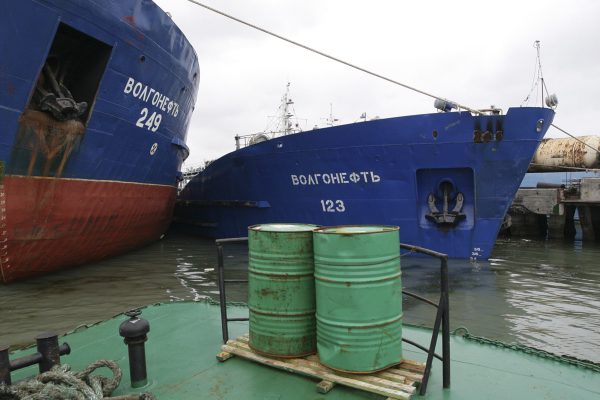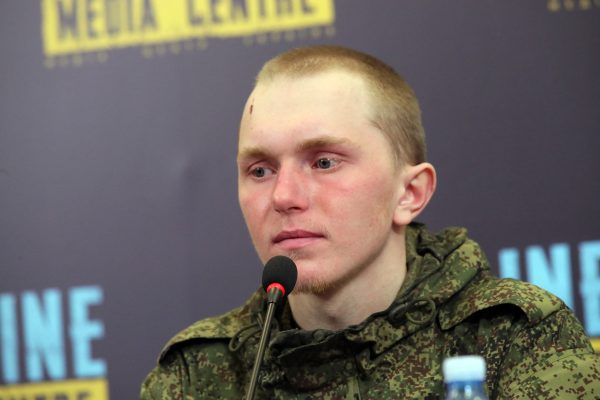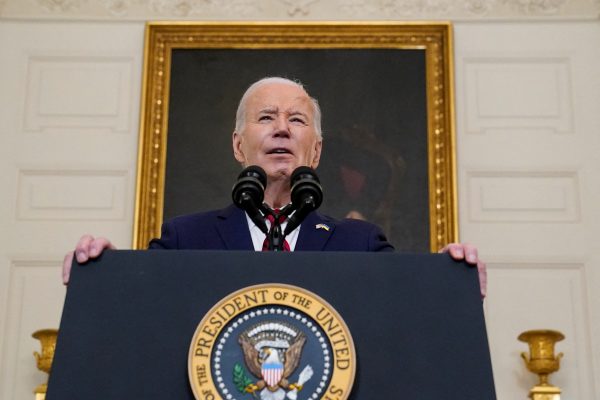The March 22 terrorist attack at Crocus City Hall, on the outskirts of Moscow, was still unfolding, and the fire was engulfing the upper levels of the seven-story concert hall when the Kremlin’s television outlets got to grips with the unfolding tragedy.
Russian law enforcement had launched a huge (if belated) manhunt to apprehend suspects who had managed to shoot dead at least 133 concert-goers attending the event by the band, Picnic. The bloodshed lasted about 20 minutes, without any apparent intervention by the security forces.
The four suspected terrorists then managed to flee the scene, although their exact number and identities were unknown at that point in time.
And yet, in the absence of almost all the key facts, Russian government officials and propagandists immediately started to blame Ukraine. (All evidence so far suggests the mass murders were, in fact, organized and executed by a branch of the so-called Islamic State terrorist group, ISIS, based in Pakistan and Afghanistan.)
Sergey Karnaukhov, host of Solovyov Live, claimed that the terrorist attack was unprecedented and had no global equivalent — seemingly forgetting the numerous, mostly Islamist terrorist attacks of the Putin era. These included the 2002 Dubrovka theater attack, which killed 130, the 2004 Beslan school siege, which left 330 dead, and several others.
More recently, the October 7 Hamas pogrom in Israel resulted in at least 1,200 deaths — an event that Russian propagandists branded as “good news,” while mocking the Israelis for their lack of preparedness.
Earlier this month, the US had publicly warned of a potential attack targeting large gatherings in Moscow. Just three days before the massacre, President Vladimir Putin dismissed these warnings and said they resembled “outright blackmail and an intention to intimidate and destabilize [Russian] society.”
Following the attack, these warnings were cited as evidence that the West had foreknowledge of the planned assaults.
Karnaukhov said: “All of you remember, embassies of the United States and Great Britain called on their citizens to leave Russia due to the impending terrorist attacks. What did you mean? You knew this?”
He added: “We know that Ukraine is the link between British and American intelligence services . . . Ukraine is a proxy force of American and British military and intelligence services. Does anyone have any doubt as to who did this?” Karnaukhov confidently asserted, “I’m sure that Ukraine did this!” The US-British motive was apparently to “delegitimize” Putin as a leader by depicting him as unable to protect his people despite a prior warning.
Karnaukhov remarked that the evacuation of survivors was currently underway, and law enforcement was in the process of storming Crocus City Hall. Even at that early stage, he urged Russians to reject any claim linking the attack with terrorist cells or groups, insisting that Ukraine and the West were certainly to blame. “Without a doubt, the main organizers of this act are sitting in London, Washington, and Kyiv,” he told Russians grappling with the terrible news.
The TV host then played a deepfake clip of Ukraine’s top security official Oleksiy Danilov, which was designed to show that Ukraine — and not ISIS — had actually accepted responsibility. Shortly thereafter, Karnaukhov admitted it might have been an old clip, but insisted that it “doesn’t change anything.”
The show then wheeled in another senior propagandist, Armen Gasparyan, who likewise blamed the West and Ukraine and predicted that Moscow “would drive a wooden stake” through the chest of the perpetrators, drawing parallels with Russia’s brutal tactics previously used in Chechnya — along with the physical liquidation of the Ukrainian government.
Dmitry Medvedev, Deputy Chairman of Russia’s Security Council, posted on his Telegram account: “If it is established that these are terrorists of the Kyiv regime, it is impossible to deal with them and their ideological masterminds in any other way [than by executions and repression.] All of them must be found and mercilessly destroyed as terrorists — including government officials of a nation that committed such an atrocity. A death for a death.”
When ISIS did claim responsibility, some hours after the event, it was dismissed by senior figures in the propaganda hierarchy. The head of RT, Margarita Simonyan, wrote on X (Twitter): “ISIS! ISIS??? About ISIS, that’s fake.” She repeatedly blamed the Ukrainians, using slurs, calling them “dogs,” and describing the West as their “trainers.”
The early narrative did not alter, even as information emerged to support Islamist responsibility. After the alleged attackers were captured and revealed to be from Tajikistan, Simonyan claimed that the West knew the identities of terrorists in advance, though she offered no evidence.
Meanwhile, it appeared the Russian security forces were using tested torture techniques to find more about the alleged gunmen. In a graphic video posted on Telegram, one of the detained had his ear cut off and was then forced to eat it by one of his interrogators.
Despite the evidence of what had transpired being readily available, Karnaukhov preposterously claimed that the suspect’s ear “was ripped off by a tree branch, as he ran through the forest.”
The man was identified as Radzhab Alizade. Karnaukhov played a clip of his interrogation, during which a voice off-camera sternly reminded the suspect: “I’m right here! You only have one ear left.” Alizade struggled to answer questions and was barely able to speak Russian. Another suspect was provided with an interpreter to communicate with his interrogators.
Russian authorities routinely resort to violence and torture to obtain a desired confession. The problem is that suspects may say what the interrogator demands to avoid further abuse rather than tell the truth. It’s equally clear they will be forced to claim links to Ukraine — even though ISIS-K reportedly posted a video pre-recorded on Alizade’s phone and claimed responsibility.
In his speech to the nation the following day, March 23, Putin made no mention of ISIS and instead alleged that attackers were captured “while fleeing to Ukraine.” The Bryansk Region, where the suspects are said to have been apprehended, borders both Belarus and Ukraine.
From a wholly cynical Kremlin perspective, the terror attack was too good an opportunity to waste.
Known to the world as a state that uses terrorist methods against its own people and against its neighbors (see the endless stream of war crimes in Ukraine), Russia’s rulers jumped at the chance to tar Ukraine’s government with the same brush.
The Islamist threat to Russia is established and decades-old, but it serves no useful propaganda purpose.
Alleged ties to Ukraine, on the other hand, are deemed useful to undermine global support for Ukraine’s ongoing fight against the Russian invasion.
The attack can also be used as a justification for even more brutal measures against Ukrainians and the tightening of screws on the domestic opposition.
It’s clear why the claims of so-called Ukrainian ties suit the Kremlin, and why — as so often — the truth does not.
Julia Davis is a columnist for The Daily Beast and the creator of the Russian Media Monitor. She is a member of the Academy of Television Arts and Sciences, the Screen Actors Guild, and Women In Film.
Europe’s Edge is CEPA’s online journal covering critical topics on the foreign policy docket across Europe and North America. All opinions are those of the author and do not necessarily represent the position or views of the institutions they represent or the Center for European Policy Analysis.





